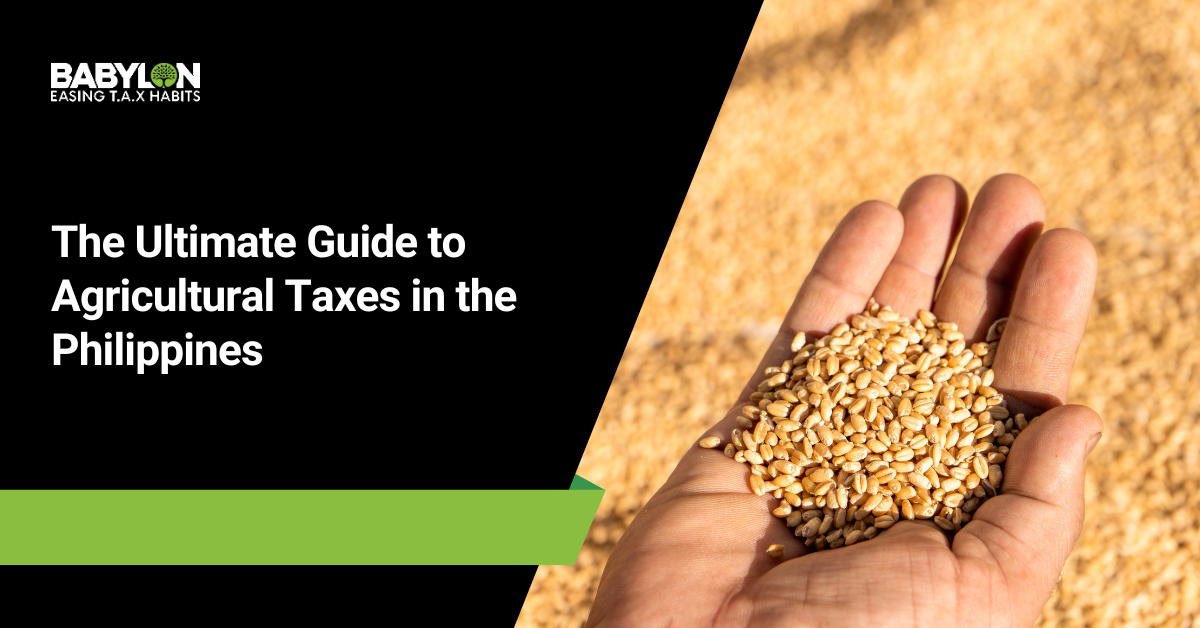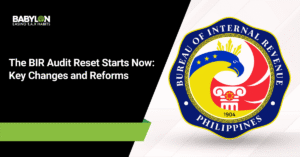In addition to being the foundation of the Philippine economy, agriculture is a growing industry that merits understanding, particularly with regard to taxation. This guide explains what you need to know about Philippine agricultural taxes, whether you’re an agribusiness owner, farmer, or just interested in the system’s operation.
What’s the Percentage Tax on Agricultural Products?
The percentage tax is a business tax levied in the Philippines on individuals or organizations who are not VAT-registered and whose gross yearly sales or receipts do not exceed ₱3 million. Nonetheless, a large number of agricultural products—particularly those in their originating state—are free from percentage tax. The general percentage tax rate, when applicable, is 3% of gross quarterly sales or revenues.
Are Agricultural Products Exempt from Percentage Tax?
Yes, the percentage tax does not apply to agricultural products in their original state. Rice, grain, fruits, vegetables, cattle, and marine products are examples of goods that have not been processed further than drying, cleaning, and packaging. However, if agricultural products are sold by non-VAT taxpayers after they have been processed (such as made into jams, canned goods, or cooked), they can be liable to percentage tax.
Are Agricultural Products VAT-Exempt?
Agricultural and marine food products in their original state are free from VAT under the Philippine Tax Code. As a result, producers and farmers are exempt from paying the typical 12% Value-Added Tax (VAT) on these goods. However, if the products are processed or value-added beyond their initial state, VAT may be applicable, much like percentage tax.
How to Compute Withholding Tax on Agricultural Products in the Philippines?
The purchases of agricultural products in their original state are exempt from Expanded Withholding Tax (EWT) up to ₱300,000 per seller per year. Here’s how it works:
Under Revenue Regulations No. 6‑2009, Article III.A.3, “for purchases involving agricultural products in their original state, the tax required to be withheld… shall be exempt” — i.e., no withholding is required for such purchases
For annual purchases from a single Agricultural Producer (AP) not exceeding ₱300,000, the buyer must issue BIR Form 2304 certifying that the payment is not subject to withholding.
So while purchases up to ₱1 million can be transacted without issuing receipts/invoices (with a simplified book instead) under RR 12-2023, the withholding tax exemption remains only up to ₱300,000 per year. For amounts above this, 1% withholding applies once you exceed ₱300,000.
Is Agricultural Income Taxable in the Philippines?
Agricultural revenue is subject to taxes, but there are some significant exceptions:
- Small farmers are exempt if their yearly income is less than the income tax threshold, which is now ₱250,000.
- If they are part of specific programs like the Barangay Micro Business Enterprises (BMBE) or BOI-registered enterprises, registered farmers and agribusinesses may also benefit from reduced income tax rates or incentives.
How to Calculate Agricultural Income Tax with Example
To calculate income tax, determine net taxable income (gross income minus allowable expenses), then apply the graduated income tax rates.
Example:
- Gross income from vegetable farming: ₱500,000
- Allowable expenses (seeds, fertilizers, labor, etc.): ₱300,000
- Net income: ₱200,000
Since ₱200,000 is below the ₱250,000 income tax exemption threshold, the farmer pays zero income tax.
If net income were ₱400,000:
- Taxable income = ₱400,000 – ₱250,000 = ₱150,000
- Income tax (based on BIR tax table) = ₱15,000
What is a Property Tax on Agricultural Land in the Philippines?
Agricultural lands are subject to real property tax (RPT), assessed by local government units (LGUs). The basic tax rate is:
- 1% of the assessed value in provinces
- 2% in cities or municipalities within Metro Manila
The assessed value is a percentage (typically 40%) of the fair market value as determined by the local assessor’s office.
Example:
- Fair market value = ₱1,000,000
- Assessed value (40%) = ₱400,000
- Real property tax (in province) = 1% of ₱400,000 = ₱4,000 annually
What Are Agricultural Tax Exemptions in the Philippines?
Several tax exemptions benefit the agriculture sector:
- VAT and percentage tax exemptions for unprocessed agricultural products.
- Income tax exemptions for small farmers and cooperatives.
- Real property tax exemptions for land reform beneficiaries or land used exclusively for agriculture.
- Tax incentives for BOI-registered agribusinesses under the CREATE Law.
- Exemption from withholding tax under certain BIR rulings or for cooperatives.
Are agricultural producers exempt from issuing sales invoices?
Revenue Regulation No. 12-2023 allows small agricultural producers earning up to ₱1 million annually to skip issuing official receipts or invoices—so long as they keep a simplified sales book. This helps small farmers and vendors stay compliant without the paperwork hassle. But take note: if their total sales exceed ₱1 million, or more than 30% of their sales come from non-agricultural goods, full documentation rules apply again.
Also, while this rule eases receipt requirements, the withholding tax exemption still only covers up to ₱300,000 in sales per buyer per year. Anything beyond that is subject to 1% withholding tax.
Final Thoughts
In the Philippines, agricultural taxes are intended to ensure tax compliance while assisting the farming industry. It’s important to comprehend the requirements and criteria for exemption, even though many agricultural goods and incomes are free from income tax, VAT, or percentage tax. To optimize available incentives and maintain compliance, farmers, agribusiness owners, and investors should speak with the Bureau of Internal Revenue (BIR) or a tax expert.
DISCLAIMER: This article is developed by subject matter experts at Babylon2k. This is for general information only and does not constitute expert advice. It is based on current regulations and may not account for all related topics. Any tax or compliance guidance provided cannot be used to avoid penalties or promote specific actions. Laws and interpretations may change over time, which could affect the accuracy of this report. We are not obligated to update this advisory if new regulations arise.
How We Can Help
Babylon2k’s B.E.T.H. can also help you when you need more information and clarification on taxes, businesses, finance, laws, and more. Learn More >
☎️ Get in Touch!
- Request a Free Consultation | Request Consult
- Message us on Viber/ Whatsapp Number @ +63-927-945-3382.
- Email us directly at [email protected]






